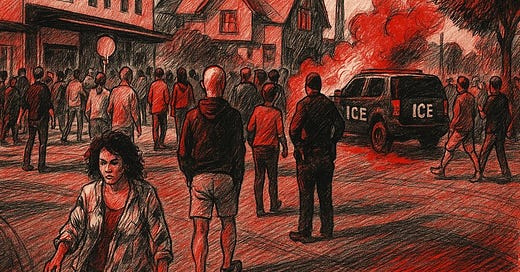Would you be kind enough to consider supporting full-time independent writers like me by subscribing today. Or, if you’re feeling generous in a small way, maybe you’ll wanna send a little (or a lot) of dirty chai latte love my direction. Every bit helps keep this Taoist journey flowing.
There are moments when what’s happening in the U.S. feels like we’re living in a science fiction novel. When a place typically filled with joy, laughter, and the smell of garlic and wood-fired pizza suddenly becomes the scene of fear, rage, and disbelief.
That’s what happened on Beech Street in South Park, my old San Diego neighborhood—a tight-knit enclave where the friendly coffee baristas remember your name, and neighbors smile and say hello whenever you cross paths with them.
Then came the ICE raid.
It wasn’t just any Friday. It was the kind of South Park Friday where the sidewalks are humming, where diners line up for a coveted seat at Buona Forchetta, where the air buzzes with weekend anticipation. But on that particular day, something else filled the air: the cold clamp of handcuffs, the crack of flash bangs, the gut-wrenching silence that follows an act of institutional violence.
Twenty to twenty-five armed officers surrounded the restaurant with no announcement, no warning. They shoved the manager, handcuffed staff, and hauled away a small handful of workers who, according to reports, simply didn’t have a physical ID. It didn’t matter if they were hardworking, trusted, and kind. It didn’t matter if they were someone’s son, someone’s friend. The raid shook everyone.
People fled. Some staff are still too traumatized to return. The restaurant shuttered that night—not because of poor business, but because of fear.
And I felt it all from a distance: the anger, the disgust, the helpless fury.
But then I asked myself the hardest question of all:
What would the Tao say?
The Tao Te Ching reminds us:
“The more rules and regulations, the more thieves and robbers there will be.” (Chapter 57)
What is law without humanity? What is enforcement without wisdom? In the name of law, we’ve criminalized survival, demonized the very hands that serve us our meals, care for our children, pick our produce.
Taoism teaches us to live in alignment with nature, with simplicity, and above all, with compassion. But compassion is the very thing that was flash-banged out of South Park that day.
What does a Taoist response look like amid injustice?
It doesn’t look like silence.
But it also doesn’t look like vengeance.
The Tao teaches us to observe and reflect deeply. In moments of great disruption, we are told to not resist with more force but to become like water—adapting, flowing, wearing away injustice not with more violence, but with steady, unrelenting presence.
That doesn’t mean doing nothing.
He who stands on tiptoe is not steady. He who reveals himself is not luminous.” (Tao Te Ching, Chapter 24)
If we react in ways that escalate harm, we lose our footing. But if we retreat into apathy, we lose our light.
What happened at Buona Forchetta is not just a case of government overreach or broken immigration policy. It’s a human wound. One that bleeds through every immigrant kitchen, every brown body questioned for daring to dream.
The I Ching reminds us in Hexagram 51, Zhen—The Arousing (Shock, Thunder):
“Shock brings success. Shock comes—oh, oh! Laughing words—ha, ha! The shock terrifies for a hundred miles, and he does not let fall the sacrificial spoon and chalice.”
The image is one of sudden disruption—a thunderclap that jolts the spirit. Yet the guidance is to not drop the chalice, to hold firm to one’s values, to remain present through the shock.
South Park was shocked. But what now?
Do we pretend it didn’t happen because it’s inconvenient? Or do we hold the chalice of our shared humanity firmly, refusing to let go of kindness, fairness, and dignity?
My Taoist heart breaks. It also steadies.
I don’t pretend to have the answers to America’s immigration crisis. But I do know that these kinds of raids fracture more than just institutions—they break the invisible threads of community trust. They create a world where workers live in fear of showing up to do the very jobs that keep our economy and our lives running.
A Taoist response starts with listening. With witnessing. With walking down Beech Street not to gawk but to ask: How can I help you feel safe again? What can I do to ensure you know you are welcome here?
And maybe it means we stop pretending that paperwork defines personhood. That borders define morality. That fear is a tool we can ethically use to build safety.
Because there is no safety in a world that sends flash bangs into pizzerias.
Buona Forchetta may have reopened the next day, but I’m sure something has shifted in South Park. The wound is fresh. But like all things in the Tao, healing comes not from forcing it closed—but from letting it breathe, speak, and be held by the community.
To the workers who were taken:
May you know peace.
To those who remained:
May your fear become courage.
To those of us watching:
May we not look away.
And to the Tao within us all:
May we learn again how to be water.




